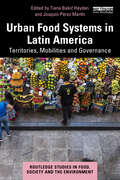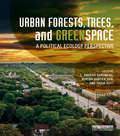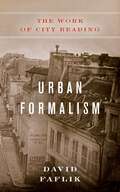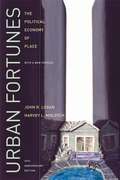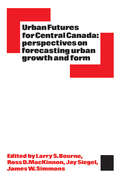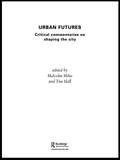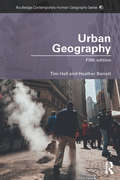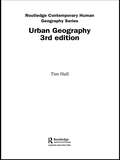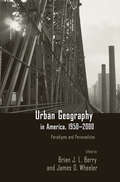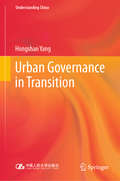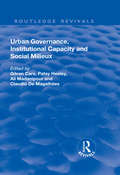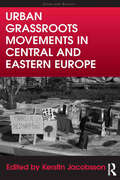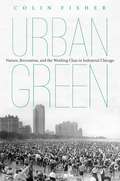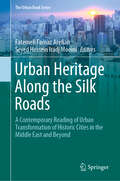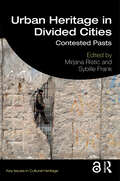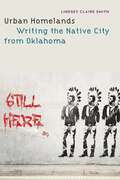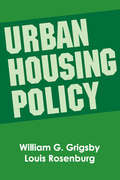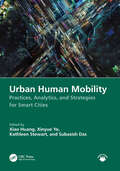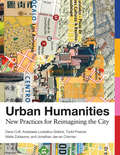- Table View
- List View
Urban Food Systems in Latin America: Territories, Mobilities and Governance (Routledge Studies in Food, Society and the Environment)
by Tiana Bakić Hayden Joaquín Pérez MartínDrawing on a range of case studies from across Latin America, this book highlights the ways that urbanization shapes the food systems that feed this region’s cities, approaching the problem of food in cities as a particularly urban problem.Latin America is the most urbanized area in the world, with nearly 80% of the population living in cities, where rates of food and nutritional insecurity are persistently high, and where the social and spatial organization is characterized by inequality and segregation. The broader questions addressed in this volume are as follows: How do the specific processes and dynamics of Latin American urbanization influence or shape food systems? How can urban food systems develop forms of governance that supports food security and sustainability? After a general introduction, this volume is organized into three main sections: Territories, mobilities, and governance. The chapters consider how specific elements such as urban planning, zoning, migration, gentrification, informal settlements, logistics, retailers, wholesale markets and street vendors, among others, contribute to shaping how food is distributed, sold, and bought in cities. Drawing on studies and theoretical approaches written by scholars and practitioners from Argentina, Brazil, Chile, Ecuador and Mexico, this book provides a Latin American perspective on global discussions surrounding the role of cities in ensuring food access to urban populations.This volume will be of great interest to students, scholars, and policymakers interested in food systems, urban food, urban planning, sustainable urban development, and Latin American studies.
Urban Forestry and Arboriculture in Malaysia: An Interdisciplinary Research Perspective
by Sreetheran Maruthaveeran Wendy Y. Chen Justin MorgenrothThis book represents the latest research on urban forestry in a Malaysian context. It demonstrates that urban forestry is concerned not only with environmental enhancement, but also other aspects, such as recreation, health and well-being, and government policies. This edited collection provides a comprehensive overview of urban forestry studies from various researchers in Malaysia, and includes rich historical perspectives of urban forestry in the country. It also tackles related issues in policy. The greening of urban Malaysia in the 1970s focused primarily on beautification and was primarily the province of horticulturists, landscapers, nursery workers, town planners, and architects, with negligible inputs from foresters, particularly urban foresters. Perhaps for that reason, the term “landscaping” has been used more widely than “urban forestry” by government and private institutions, politicians, stakeholders, academicians, and the public. Nevertheless, the authors show that the concept of urban forestry is not new for developing countries such as Malaysia, where urbanization is increasing at a rapid rate. The book unpacks this demographic shift from a predominantly rural to a principally urban society. As the only unified body of work on urban forestry and arboricultural studies in Malaysia, this volume presents an important interdisciplinary reference for students, researchers, and scholars in physical geography, forestry and urban forestry, arboriculture and landscape architecture, both in Malaysia, and in other developing urbanizing countries, particularly in Southeast Asia. It is also an important resource for those working in environmental policy and practice, excavating the vital connection between the environment and well-being.
Urban Forests, Trees, and Greenspace: A Political Ecology Perspective (Routledge Studies in Urban Ecology)
by L. Anders Sandberg Adrina Bardekjian Sadia ButtUrban forests, trees and greenspace are critical in contemporary planning and development of the city. Their study is not only a question of the growth and conservation of green spaces, but also has social, cultural and psychological dimensions. This book brings a perspective of political ecology to the complexities of urban trees and forests through three themes: human agency in urban forests and greenspace; arboreal and greenspace agency in the urban landscape; and actions and interventions in the urban forest. Contributors include leading authorities from North America and Europe from a range of disciplines, including forestry, ecology, geography, landscape design, municipal planning, environmental policy and environmental history.
Urban Formalism: The Work of City Reading (Polis: Fordham Series in Urban Studies)
by David FaflikUrban Formalism radically reimagines what it meant to “read” a brave new urban world during the transformative middle decades of the nineteenth century. At a time when contemporaries in the twin capitals of modernity in the West, New York and Paris, were learning to make sense of unfamiliar surroundings, city peoples increasingly looked to the experiential patterns, or forms, from their everyday lives in an attempt to translate urban experience into something they could more easily comprehend. Urban Formalism interrogates both the risks and rewards of an interpretive practice that depended on the mutual relation between urbanism and formalism, at a moment when the subjective experience of the city had reached unprecedented levels of complexity.This book not only provides an original cultural history of forms. It posits a new form of urban history, comprising the representative rituals of interpretation that have helped give meaningful shape to metropolitan life.
Urban Fortunes: The Political Economy of Place
by John R. Logan Harvey L. MolotchThis sociological classic is updated with a new preface by the authors looking at developments in the study of urban planning during the twenty-year life of this influential work.
Urban Futures for Central Canada: Perspectives on Forecasting Urban Growth and Form
by Jay Siegel L. S. Bourne Ross D. Mackinnon James W. SimmonsUrban problems are now a dominant social issue: the essays in this volume consider the direction some of these problems may take in Central Canada. Three broad themes are discussed: forecasting (a spectrum of methodologies and urban forecasts); assessing the consequences of these forecasts at two levels (the growth of cities as an urban system and the growth and form of individual cities or urban regions); and assessing the role of changes in public policy. Specific topics include forecasting methodology in a spatial context, population and employment growth, migration, transportation, innovations, communication linkages, regional economic structure, economic fluctuations, the effects of public policy controls within a system of cities, land use and redevelopment, household mobility and social change, the spread of urban fields, and communities and neighbourhoods within cities.
Urban Futures: Critical Commentaries on Shaping Cities
by Malcolm Miles Tim HallUrban Futures brings together commentaries from a wide range of contemporary disciplines and fields relevant to urban culture, form and society. The book concerns cities in the broadest sense, not just as buildings and spaces, but also as processes and events or sites of occupation, in which meanings are constructed in many ways. The contributors draw on their specialist areas of research to inform current debate, but they also speculate as to how cities will be shaped in the 21st century.Specific areas of research include homeless people's organisations and restoration ecology in brownfield sites in the USA, post-industrial urban landscapes, post-industrial economics, tourism and cultural planning. The book allows each writer to state their own conclusions, but together they suggest that tomorrow's cities will, while remaining locations of difference and contestation, be rapidly evolving systems in which dwellers assume increasing responsibilities and power.
Urban Geography (Routledge Contemporary Human Geography Series)
by Tim Hall Heather BarrettThis revised fifth edition not only examines the new geographical patterns forming within and between cities, but also investigates the way geographers have sought to make sense of this urban transformation. It is structured into three sections: 'contexts', 'themes' and 'issues' that move students from a foundation in urban geography through its major themes to contemporary and pressing issues. The text critically synthesizes key literatures in the following areas: the urban world changing approaches to urban geography urban form and structure economy and the city urban politics planning, regeneration and urban policy cities and culture architecture and urban landscapes images of the city experiencing the city housing and residential segregation transport and mobility in cities sustainability and the city. This edition builds on the success of the comprehensively revised fourth edition and provides revised chapters on transport/mobility and urban futures, with additional updating of readings and some case studies. The book synthesises a wide range of literature on each subject and presents the material in a lively engaging way, supported by an expanded range of student friendly features, including exercises and suggestions for further study.
Urban Geography (Routledge Contemporary Human Geography Series)
by Tim HallMore than simply examining the new geographical patterns forming within cities, this third edition of Urban Geography also investigates the way geographers have sought to make sense of this urban transformation. Tim Hall critically synthesizes key literatures in the following areas: approaches to urban geography economic geography of the city urban policy new urban forms and landscapes impacts of urban change sustainability and the city. Hall's revised third edition features enhanced pedagogy including boxed discussion points, end of chapter research questions, and an introductory chapter which outlines the importance of urban geography. Additionally a new concluding chapter encourages students to apply what they have read to their own experiences of cities and helps them to apply these ideas to a dissertation. An important volume, this revised edition is an essential read for students and scholars of urban geography.
Urban Geography in America, 1950-2000: Paradigms and Personalities
by Brian J. L. Berry James O. WheelerUrban Geography in America offers a comprehensive historiography of this major field. Compiling the best essays from the flagship journal Urban Geography , it shows the evolution of the field from the 1950s to 2000, as it shifted from data-driven social science modeling in the 1960s to the more critical perspectives of the 1970s to postmodernism in the 1980s to feminism and globalization in the 1990s. It covers all the major trends and figures, and features some of the most important names in the field. Ultimately, this will be a necessary reference for all scholars in the field and all graduate students taking introductory courses and preparing for their comprehensive exams.
Urban Geography: A Critical Introduction
by Mary Thomas Eugene McCann Andrew E.G. JonasUrban Geography a comprehensive introduction to a variety of issues relating to contemporary urban geography, including patterns and processes of urbanization, urban development, urban planning, and life experiences in modern cities.
Urban Geography: A Critical Introduction (Critical Introductions to Geography)
by Mary Thomas Eugene McCann Andrew E. JonasUrban Geography a comprehensive introduction to a variety of issues relating to contemporary urban geography, including patterns and processes of urbanization, urban development, urban planning, and life experiences in modern cities. Reveals both the diversity of ordinary urban geographies and the networks, flows and relations which increasingly connect cities and urban spaces at the global scale Uses the city as a lens for proposing and developing critical concepts which show how wider social processes, relations, and power structures are changing Considers the experiences, lives, practices, struggles, and words of ordinary urban residents and marginalized social groups rather than exclusively those of urban elites Shows readers how to develop critical perspectives on dominant neoliberal representations of the city and explore the great diversity of urban worlds
Urban Governance in Transition (Understanding China)
by Hongshan YangThis book offers readers a comprehensive introduction to the functions of the government in contemporary China. Further, it creates a framework to describe urban governance in today’s China, which consists of four basic modes: the omnipotent government mode, autonomous governance mode, integrated governance mode and cooperative governance mode. The book defines a “city” as a gathering place for high-quality public service resources, and the basic task of urban governance is to provide high-quality public services and maintain the sustainability of fiscal revenues. By focusing on current “hot topics” in urban governance in China, including the institutional development of urban governance, model interpretation, city/county relationship, cross-border governance, cross-sectoral coordination, street management, community service provision, and municipal performance evaluation, it clarifies a number of common misunderstandings in the field of urban management and practice. Lastly, the book analyses the current integrated governance model used in Chinese cities, which relies on the authority of the government and integrates the market and social subjects across borders by means of qualification identification, resource support, elite absorption, party-group embeddedness, and project cooperation. However, this model is currently facing several problems. In order to address the potential risks of integrated governance, the book argues that we need to develop new institutional arrangements based on collaborative governance.
Urban Governance, Institutional Capacity and Social Milieux (Routledge Revivals)
by Ali Madanipour Patsy Healey Claudio De Magalhães Göran CarsThis title was first published in 2002: Urban governance has faced numerous challenges as city governments, their partners and their critics struggle to transform themselves in the context of post-industrial economies and societies. This context has generated new relations of economic life and social activity to be accommodated in cities, and has also changed expectations of the roles, relationships and modes of governance. New conceptual tools to analyze these experiences are becoming available, linked to a broad "institutionalist" wave of ideas sweeping right across the social sciences. This text responds to the challenges faced by urban governance and explores a range of efforts to build new institutional capacities. An international team of social scientists and practitioners critically analyzes conceptual challenges, policy developments and practical experiences.
Urban Grassroots Movements in Central and Eastern Europe (Cities and Society)
by Kerstin JacobssonWhat can we learn about collective action across Central and Eastern Europe by focusing on activism within urban spaces? This volume argues that the recent resurgence of urban grassroots mobilisation represents a new phase in the development of post-socialist civil societies and that these civil societies have significantly more vitality than is commonly perceived. The case studies here reflect the diversity and complexity of post-socialist urban movements, capturing also the extent to which the laboratory of urban politics is richly illustrative of the complex nexus of state-society-market relations within post-socialism. The grassroots campaigns and actions reflect the new social cleavages and increased polarisation as a consequence of neoliberal urbanisation and global integration, as well as the transformation of state power and authority in the region. Studying urban activism in Central and Eastern Europe is instructive for urban movements scholars generally, as it forces us to acknowledge the variety of forms that contention can take and the usefulness of embedding the study of urban movements within a larger understanding of civil society.
Urban Green
by Colin FisherIn early twentieth-century America, affluent city-dwellers made a habit of venturing out of doors and vacationing in resorts and national parks. Yet the rich and the privileged were not the only ones who sought respite in nature. In this pathbreaking book, historian Colin Fisher demonstrates that working-class white immigrants and African Americans in rapidly industrializing Chicago also fled the urban environment during their scarce leisure time. If they had the means, they traveled to wilderness parks just past the city limits as well as to rural resorts in Wisconsin and Michigan. But lacking time and money, they most often sought out nature within the city itself--at urban parks and commercial groves, along the Lake Michigan shore, even in vacant lots. Chicagoans enjoyed a variety of outdoor recreational activities in these green spaces, and they used them to forge ethnic and working-class community. While narrating a crucial era in the history of Chicago's urban development, Fisher makes important interventions in debates about working-class leisure, the history of urban parks, environmental justice, the African American experience, immigration history, and the cultural history of nature.
Urban Growth and Environmental Issues in India
by Rashmi Jain Alpana KatejaThis book examines the interplay between urban growth and the environmental issues in India. The contributors, who are coming from diverse disciplines, examine socioeconomic, administrative, and environmental threats emanating from urbanization (e.g. climate change, health governance, energy issues, pollution, and e-waste management) and suggest various measures for dealing with the challenges of rapid urbanization. Offering a valuable resource for all those interested in understanding the multifaceted dimensions of urban growth, the book appeals to researchers, students, and policymakers, interested in the development studies and urban studies.
Urban Health: Erkenntnisse zur Gestaltung einer „gesunden“ Stadt (essentials)
by Wolfgang SchlichtWolfgang Schlicht stellt das Forschungsgebiet Urban Health, im Deutschen auch StadtGesundheit, vor, in dem er zu Beginn einen kurzen Abriss zur Geschichte der Stadt, zu Leitbildern der Stadtgestaltung und zu Urban Health gibt. Ausgew#65533;hlte Erkenntnisse zu Stadtmerkmalen, die Gesundheit beeintr#65533;chtigen (reaktions-orientierte Perspektive), und zu solchen, die Gesundheit f#65533;rdern (promotions-orientierte Perspektive), werden referiert. Theoretische Konzepte und methodische #65533;berlegungen zur Erkenntnisgewinnung runden das essential ab.
Urban Heritage Along the Silk Roads: A Contemporary Reading of Urban Transformation of Historic Cities in the Middle East and Beyond (The Urban Book Series)
by Fatemeh Farnaz Arefian Seyed Hossein Iradj MoeiniThis book examines examples of contemporary situation of historic regions in the Middle East and its broader geographic context connected to the historic trade routes, offering cross-disciplinary and cross-sectoral perspectives. The region is home to ancient settlements and early human endeavors to form cities, and across the region historic urban historic features, such as ancient city centers, still exist alongside contemporary ones. Many of those historic regions are along the Silk Roads. However, the urban continuity that once existed over generations in the physical and social paradigm have been interrupted by rapid urbanization, globalization and urban economic pressures, in addition to conflicts and frequent destructive natural hazards. It is often the case that dealing with such pressing issues in a historic city is more complex than dealing with those in newly built cities and urban areas. Based on carefully selected and updated papers from the Silk Cities 2017 International Conference, this book appeals to researches, practitioners and policy makers.
Urban Heritage in Divided Cities: Contested Pasts (Key Issues in Cultural Heritage)
by Mirjana Ristic Sybille FrankUrban Heritage in Divided Cities explores the role of contested urban heritage in mediating, subverting and overcoming sociopolitical conflict in divided cities. Investigating various examples of transformations of urban heritage around the world, the book analyses the spatial, social and political causes behind them, as well as the consequences for the division and reunification of cities during both wartime and peacetime conflicts. Contributors to the volume define urban heritage in a broad sense, as tangible elements of the city, such as ruins, remains of border architecture, traces of violence in public space and memorials, as well as intangible elements like urban voids, everyday rituals, place names and other forms of spatial discourse. Addressing both historic and contemporary cases from a wide range of academic disciplines, contributors to the book investigate the role of urban heritage in divided cities in Africa, Asia, the Americas, Europe and the Middle East. Shifting focus from the notion of urban heritage as a fixed and static legacy of the past, the volume demonstrates that the concept is a dynamic and transformable entity that plays an active role in inquiring, critiquing, subverting and transforming the present. Urban Heritage in Divided Cities will be of great interest to academics, researchers and students in the fields of cultural studies, sociology, the political sciences, history, human geography, urban design and planning, architecture, archaeology, ethnology and anthropology. The book should also be essential reading for professionals who are involved in governing, planning, designing and transforming urban heritage around the world.
Urban Homelands: Writing the Native City from Oklahoma
by Lindsey Claire SmithOklahoma is bound to both the South and the Southwest and their legacies of conquest and Indigenous survivance. At the same time, mobility, ingenuity, cultural exchange, and creative expression—all part of the experience of urbanization—have been fundamental to people of the tribes that call this place home. Tulsa, New Orleans, and Santa Fe, with their importance in histories of geopolitical upheaval and mobility that shaped the establishment of the United States, are key to uncovering the history of urbanization experienced by Native Americans from Oklahoma.Urban Homelands, while examining the overlooked histories of Oklahoma Indigenous urbanization relative to these regions, engages literature and film as not just mirrors of experience but as producers of it. Lindsey Claire Smith brings the work of three-time poet laureate Joy Harjo into conversation with the great Cherokee playwright Lynn Riggs and breakout filmmaker Sterlin Harjo. Flying in the face of civic landmarks and settler histories that at once obscure Native origins and appropriate Native culture for tourism, this creative reclaiming of Indigenous cities points toward the productive possibilities of recognizing untold urban histories and the creative relationships with urban space itself.
Urban Housing Markets: Recent Directions in Research and Policy
by J. Hitchcock L. S. BourneThe Conference on Urban Housing Markets sponsored by the Centre for Urban and Community Studies in October 1977 was the first major conference on housing to be held in Canada since the First Canadian Housing Conference sponsored by the Canadian Welfare Council in 1968.This volume is at once a record of the Conference and a review of important recent research on urban housing markets and related public policy issues. The book captures the flavor of a lively debate between academics and policy analysts, and the commentaries and discussion sections provide, in non-technical language, a statement of some major questions confronting government policy on housing.In addition to its use as a record of an important Canadian conference, the book is a valuable collection of recent housing research. The ten papers cover a wide variety of topics ranging from conceptual and methodological issues on the one hand to critiques of Canadian housing policies on the other. They indicate the range of issues which must be taken into account in assessing housing policy. Taken together with the discussion material which helps to focus attention on strategic issues in both Canada and the United States, they provide a useful introduction to current debates over housing policy.
Urban Housing Policy
by William G. GrigsbyFor as long as statistics record, housing conditions in the United States have been improving. Housing that only the rich once enjoyed is commonplace today; by today's standards, most of the population was ill-housed at the turn of the century. Amidst this rise, however, inadequate living accommodations for a portion of the population have stubbornly persisted. Many families endure housing deprivations that are severe, even with respect to the norms of earlier years.Development of housing policy requires a blending of technical data, theory, and political and ethical considerations. This study is organized, therefore, around a planning framework. Housing needs and objectives are specified; housing resources are identified; theories of the problem are explored; alternative strategies are reviewed; and one of several possible packages of programs is elaborated in detail. Particular emphasis is placed throughout on the multiplicity of housing and non-housing goals and programs, and on the variety of client groups, which must be taken into consideration in trying to evolve an appropriate role for the public sector in this area of social concern.Specifically, this work begins with a quick sketch of Baltimore and an examination of local problems and policies. This is followed by a description of the dimensions of housing needs. Another chapter studies the low-income market empirically from the perspective of the person whom poor families rely on for housing services - the landlord. An investigation on several theories of slums, decay, and housing abandonment is discussed, and the authors formulate a composite theory that serves as a foundation for policy decisions. The final set of chapters explores in greater detail technical aspects of the proposals contained in the text, and the concluding chapter investigates their political feasibility.
Urban Human Mobility: Practices, Analytics, and Strategies for Smart Cities
by Kathleen Stewart Xinyue Ye Subasish DasThis comprehensive handbook covers human mobility within urban contexts, integrating academic theories with pragmatic insights and offering a detailed analysis of the diverse facets of human mobility and its substantial impact on the urban landscape, economy, and societal structures. It explains key fundamental concepts, methods, and models, presenting an in-depth exploration of predictive analytics, clustering patterns, advanced trajectory embedding techniques, artificial intelligence, machine learning, geographic information systems (GIS), Internet of Things (IoT), and smart city innovations. The authors include many case studies and examples of urban mobility in practice, making the content relatable and practical for educators, students, researchers, and practitioners. Features Provides a multidisciplinary and holistic understanding of urban mobility with systematic introductions and discussions of theory, methods, technologies, tools, and applications. Covers a wide range of real-world case studies of urban mobility in practice globally that include data, programming code, and tools. Discusses cutting-edge technologies involved in mobility data analytics. Addresses practical challenges in data collection and the ethical implications of mobility research, which are crucial for professionals in the field. Offers future directions of human mobility research under the big data and artificial intelligence (AI) revolution. Urban Human Mobility: Practices, Analytics, and Strategies for Smart Cities is for professionals, academics, and upper-level undergraduate and graduate students in the fields of urban planning/design, GIScience, data mining, and social sciences.
Urban Humanities: New Practices for Reimagining the City (Urban and Industrial Environments)
by Todd Presner Dana Cuff Anastasia Loukaitou-Sideris Maite Zubiaurre Jonathan Jae-An CrismanOriginal, action-oriented humanist practices for interpreting and intervening in the city: a new methodology at the intersection of the humanities, design, and urban studies.Urban humanities is an emerging field at the intersection of the humanities, urban planning, and design. It offers a new approach not only for understanding cities in a global context but for intervening in them, interpreting their histories, engaging with them in the present, and speculating about their futures. This book introduces both the theory and practice of urban humanities, tracing the evolution of the concept, presenting methods and practices with a wide range of research applications, describing changes in teaching and curricula, and offering case studies of urban humanities practices in the field.Urban humanities views the city through a lens of spatial justice, and its inquiries are centered on the microsettings of everyday life. The book's case studies report on real-world projects in mega-cities in the Pacific Rim—Tokyo, Shanghai, Mexico City, and Los Angeles—with several projects described in detail, including playful spaces for children in car-oriented Mexico City, a commons in a Tokyo neighborhood, and a rolling story-telling box to promote “literary justice” in Los Angeles.
